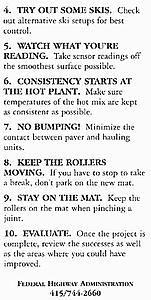U.S. Department of Transportation
Federal Highway Administration
1200 New Jersey Avenue, SE
Washington, DC 20590
202-366-4000
Focus
| Accelerating Infrastructure Innovations |
Publication Number: FHWA-RD-00-058
Date: May 2000
"Our customers are looking for a different kind of product," said Dave Ekern of the Minnesota Department of Transportation (DOT) as he opened the recent Federal Highway Administration (FHWA) Pavement Technology Delivery Workshop in Olympia Fields, Illinois. The workshop brought together staff from the FHWA resource centers, division offices, and headquarters to learn about the different kinds of products that FHWA has to offer States, including best practices for achieving smoother pavements, software that can help engineers design a Superpave mix or simplify concrete paving decisions, and the steps to take to have a falling-weight deflectometer (FWD) calibrated.
The best practices for achieving smoother hot-mix asphalt pavements are promoted in a video featuring Richard Petty, Smoother Pavements: Highways Fit for a King, that has been widely distributed to States and contractors. A second video highlighting best practices for obtaining smoother portland cement concrete (PCC) pavements is now being developed by FHWA in partnership with Kansas DOT and the American Concrete Pavement Association. These best practices are part of a four-pronged smoothness initiative that also includes evaluating and demonstrating lightweight pavement profilers, developing an American Association of State Highway and Transportation Officials (AASHTO) guide specification, and improving management practices. For more information on the smoothness initiative or to contain a copy of the Richard Petty video, contact Mark Swanlund at FHWA, 202-366-1323 (fax: 202-493-2070; email: mark.swanlund@fhwa.dot.gov). To obtain a copy of the Richard Petty video, contact Mark Swanlund at FHWA, 202-366-1323 (fax: 202-493-2070; email: mark.swanlund@fhwa.dot.gov).
Other products featured at the workshop included those produced by the long-term pavement performance (LTPP) program, such as the DataPave software, rigid pavement design software, and falling-weight deflectometer (FWD) calibration procedures. States can calibrate their FWD devices, which measure such factors as pavement structural strength, at four calibration centers located in College Station, Texas, Harrisburg, Pennsylvania, Minneapolis, Minnesota, and Reno, Nevada. For State highway personnel who have never been to a center or would like their visits to run more smoothly, the logistics of visiting a calibration center are covered in a new videotape, How to Work with Your FWD Calibration Center. The video is available from Katherine Petros at FHWA, 415-744-0652 (fax: 415-744-2620; email: katherine.petros@fhwa.dot.gov).
The rigid pavement design software, which is in the form of a Microsoft Excel spreadsheet, allows engineers to tailor a PCC pavement design to site-specific materials and traffic conditions, resulting in a better and more cost-effective design. The software incorporates improved design procedures adopted by AASHTO and published in the 1998 Supplement to the AASHTO Guide for Design of Pavement Structures, Part II-Rigid Pavement Design & Rigid Pavement Joint Design. These improved procedures cover such things as faulting and corner break prediction, joint spacing design, and consideration of slab/base friction. Copies of the software can be ordered from the LTPP Web site at https://www.fhwa.dot.gov/pavement/ltpp/product.cfm.
Monte Symons of FHWA gave presentations on the DataPave and LTPPBind software programs. DataPave is the primary source of data from the LTPP test sections, covering such elements as climate, load, materials, response, structure, and distress. "Using DataPave, State and provincial highway agencies can develop cost-effective pavement strategies that address their own unique requirements," said Symons. Copies can be obtained from LTPP customer support services at 865-481-2967 (fax: 865-481-8555; email: ltppinfo@fhwa.dot.gov).
LTPPBind is a software tool that engineers can use to select the best performance grade (PG) binder to use when designing a Superpave pavement, based on climatic data. CD-ROM copies are also available from the LTPP customer service line at 865-481-2967 (fax: 865-481-8555; email: ltppinfo@fhwa.dot.gov).
 |
 |
| This card, featuring tips for smoother hot-mix asphalt pavements, comes with the video Smoother Pavements: Highways fit for a King. |